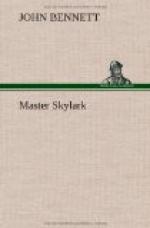Nick peered through the brightness. “Master Will—Master Will Shakspere!” he gasped.
“Well, my lady,” said the quiet man; “what wilt thou have of me?”
Nick Attwood had come to his fellow-townsman at last.
Over the hedge where the lantern shone through the green of the apple-leaves came a sound of voices talking fast, a listening hush, then a clapping of hands, with mingled cries of “Good boy!” “Right, lad; do not leave her till thou must!” and at the last, “What! take thee home to thy mother, lad? Ay, marry, that will I!” And the last was the voice of the quiet man.
Then followed laughter and scraps of song, merry talking, and good cheer, for they all made glad together.
* * * * *
Across the fields beyond the hedge the pathway ran through Paris Garden, stark and clear in the white moon-shine, save here and there where the fog from the marsh crept down to meet the river-mist, and blotted out the landscape as it went. In the north lay London, stirring like a troubled sea. In the south was drowsy silence, save for the crowing of the cocks, and now and then the baying of a hound far off. The smell of bears was on the air; the river-wind breathed kennels. The Swan play-house stood up, a great, blue blank against the sky. The sound of voices was remote. The river made a constant murmur in the murk beyond the landing-place; the trees moved softly.
Low in the west, the lights of the Falcon Inn were shrunk to pin-pricks in the dark. They seemed to wink and to shut their eyes. It was too far to see the people passing by.
On a sudden one light winked and did not open any more; and through the night a faint, far cry came drifting down the river-wind—a long, thin cry, like the wavering screech of an owl—a shrill, high, ugly sound; the lights began to wink, wink, wink, to dance, to shift, to gather into one red star. Out of the darkness came a wisp of something moving in the path.
Where the moonlight lay it scudded like the shadow of a windy cloud, now lost to sight, now seen again. Out of the shadow came a man, with hands outstretched and cap awry, running as if he were mad. As he ran he looked from side to side, and turned his head for the keener ear. He was panting hard.
When he reached the ditch he paused in fault, ran on a step or two, went back, stood hesitating there, clenching his hands in the empty wind, listening; for the mist was grown so thick that he could scarcely see.
But as he stood there doubtfully, uncertain of the way, catching the wind in his nervous hands, and turning about in a little space like an animal in a cage, over the hedge through the apple-boughs a boy’s clear voice rose suddenly, singing a rollicking tune, with a snapping of fingers and tapping of feet in time to its merry lilt.
Then the man in the mist, when he heard that clear, high voice, turned swiftly to it, crying out, “The Skylark! Zooks! It is the place!” and ran through the fog to where the lantern glimmered through the hedge. The light fell in a yellow stream across his face. He was pale as a ghost. “What, there, within! What, there!” he panted. “Shakspere! Jonson! Any one!”




